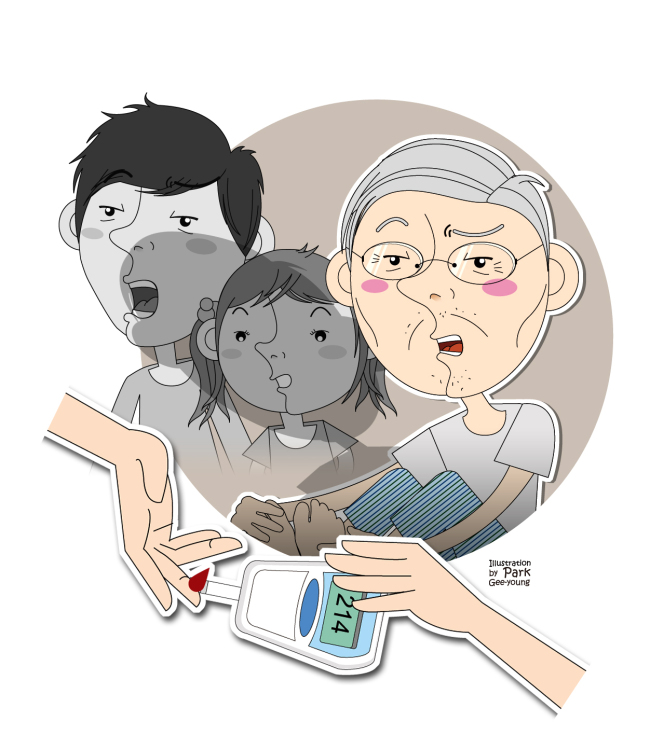Diabetes is not a single disease, but a group of heterogeneous diseases characterized by high blood glucose levels.
There are various forms of diabetes, and the family history and its association differ for each type. Diabetes can generally be divided into types 1 and 2. Type 1 diabetes is caused by an absolute deficiency of insulin in the body, and requires insulin treatment. Type 2 diabetes has various causes, including insulin resistance, insulin secretory dysfunction, and increased gluconeogenesis. It is often known as adult-type diabetes. There are other types of diabetes, an example of which is MODY (Maturity Onset Diabetes of the Young).
There are various forms of diabetes, and the family history and its association differ for each type. Diabetes can generally be divided into types 1 and 2. Type 1 diabetes is caused by an absolute deficiency of insulin in the body, and requires insulin treatment. Type 2 diabetes has various causes, including insulin resistance, insulin secretory dysfunction, and increased gluconeogenesis. It is often known as adult-type diabetes. There are other types of diabetes, an example of which is MODY (Maturity Onset Diabetes of the Young).

Genetic factors are thought to contribute to both types 1 and 2 diabetes, but they are not the only cause. Other factors such as environmental factors and autoimmunity can also work together to cause diabetes. In terms of family history, the majority of patients with type 1 diabetes do not have immediate family members with the condition. However, those who have an immediate family member with type 1 diabetes have increased risk of developing diabetes.
Family history is more commonly seen in type 2 diabetes than in type 1. Those with one parent with type 2 diabetes have approximately 10-30 percent risk of developing diabetes, and those with siblings with type 2 diabetes have 10-40 percent risk of developing diabetes. It is also known that a person with both parents that have type 2 diabetes have a 40 percent risk of developing diabetes. MODY, which is seen in a small number of diabetic patients, is caused by dominant genetic defects and is inherited.
Cases of patients with a family history of diabetes who have been treated
Many patients have family histories of diabetes. However, the current treatment direction and method does not differ greatly between those with family histories of diabetes and those without. Insulin levels are the main factor that directs the treatment. Future research comparing diabetic patients with and without family histories is needed to establish a clear difference in the mechanism of the disease in these two groups. This may suggest appropriate treatments for the two groups of patients in the future.
How can diseases with family histories be prevented?
As stated above, diabetes is not only caused by genetic factors, but also by other factors such as immunological and environmental factors. Environmental factors include lifestyle factors such as diet and exercise. Even if you have a family history of diabetes, managing other factors can help to prevent the disease. Unhealthy lifestyles can cause diabetes in people even without a family history of diabetes. Therefore, it is important to have regular meals and exercise, a balanced diet of appropriate calories, and a balanced life. It is also helpful to have regular blood glucose measurements before and after meals at least once a year for prevention and early diagnosis of diabetes.
It is expected that future investigation into the development of different types of diabetes and the severity in relation to family history can help with the prevention of complications as well as the treatment.

By Lee Moon-kyu
The author is a doctor at the Division of Endocrinology and Metabolism at Samsung Medical Center and a professor of Sungkyunkwan University School of Medicine. ― Ed.
-
Articles by Korea Herald


![[AtoZ into Korean mind] Humor in Korea: Navigating the line between what's funny and not](http://res.heraldm.com/phpwas/restmb_idxmake.php?idx=644&simg=/content/image/2024/04/22/20240422050642_0.jpg&u=)

![[Exclusive] Korean military set to ban iPhones over 'security' concerns](http://res.heraldm.com/phpwas/restmb_idxmake.php?idx=644&simg=/content/image/2024/04/23/20240423050599_0.jpg&u=20240423183955)

![[Herald Interview] Why Toss invited hackers to penetrate its system](http://res.heraldm.com/phpwas/restmb_idxmake.php?idx=644&simg=/content/image/2024/04/22/20240422050569_0.jpg&u=20240422150649)
![[Graphic News] 77% of young Koreans still financially dependent](http://res.heraldm.com/phpwas/restmb_idxmake.php?idx=644&simg=/content/image/2024/04/22/20240422050762_0.gif&u=)







![[Exclusive] Korean military to ban iPhones over security issues](http://res.heraldm.com/phpwas/restmb_idxmake.php?idx=652&simg=/content/image/2024/04/23/20240423050599_0.jpg&u=20240423183955)



![[Today’s K-pop] Ateez confirms US tour details](http://res.heraldm.com/phpwas/restmb_idxmake.php?idx=642&simg=/content/image/2024/04/23/20240423050700_0.jpg&u=)